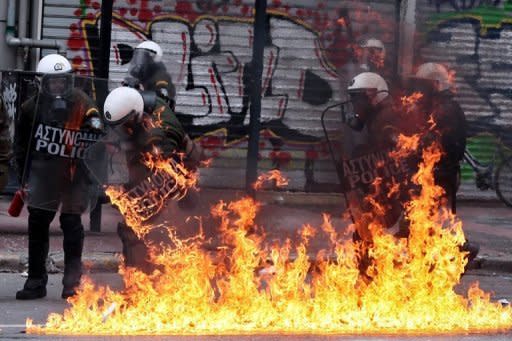Greek cabinet approves debt deal
Greece's cabinet Saturday approved tough austerity measures demanded by EU and IMF creditors after the prime minister warned that a failed debt deal and default would spark "uncontrolled chaos". The coalition government, hit by defections on Friday, approved the belt-tightening measures on a day that saw renewed street clashes between protesters and police and the start of a two-day general strike. Prime Minister Lucas Papademos had issued a stern warning after six members of his coalition government had resigned in protest at the new cuts. "A disorderly default would plunge our country into a disastrous adventure," he told the cabinet. "It would create conditions of uncontrolled economic chaos and social explosion." He warned that "sooner or later, (Greece) would be led out of the euro" and stressed: "This is an hour of historic responsibility." The remaining cabinet members in the early hours of Saturday unanimously approved the debt deal and austerity measures, which save Greece from a disorderly default in March, the prime minister's office said. The Athens News Agency said the deal was submitted to parliament for a vote Sunday but government spokesmen could not be reached for comment. Greece was explicitly told by its eurozone partners this week that it must agree to austerity measures in order to secure the release of further loans under a 130 billion euro ($171 billion) bailout pending since October. The rescue fund is essential to stave off bankruptcy on March 20, when Athens must repay nearly 14.5 billion euros in maturing debt. Three texts will be put to Sunday's vote: measures to recapitalise Greek banks, an authorisation for Papademos and Finance Minister Venizelos to sign the eurozone bailout, and a bond swap with private creditors designed to wipe out around 100 billion euros from Greece's 350-billion-euro debt, ANA said. Details on the austerity measures will be included in a follow-up law tabled in the next two weeks, the agency said. The mesaures have sparked deep anger. Clashes erupted on the sidelines of union demonstrations against 15,000 civil service layoffs and cuts in wages and pensions. Youths in hoods and motorcycle helmets broke up masonry around central Syntagma Square and threw stones at police, who fired bursts of tear gas. At least ten people were wounded, including eight police officers, and six arrests were made, a police source said. Earlier Friday, the far-right LAOS party that was part of the coalition said it would not support the further austerity cuts, and its four members in government later submitted their resignations. They were followed by the assistant foreign minister for European affairs, a socialist who accused the EU of "fixation" on a labour rights overhaul. The EU and International Monetary Fund have told Greece to revise labour agreements, slashing minimum wages and facilitating layoffs even though over a million people are already unemployed in Greece, or over 20 percent of the workforce. "This fixation directly violates the Treaty of Lisbon which recognises social cohesion, collective bargaining and the autonomy of social partners as basic values," socialist Mariliza Xenogiannakopoulou said. Another socialist, a deputy labour minister, had resigned on Thursday. The government intends to appoint replacements after the measures are approved by parliament on Sunday, state television NET said. At least five socialist and conservative deputies have declared their intention to oppose the cuts on Sunday and LAOS leader George Karatzaferis said his 16 lawmakers would do likewise. "We are not going to vote," Karatzaferis told a news conference, adding: "Humiliation was imposed on us. I do not tolerate this." In principle, the two senor coalition partners, socialist Pasok and conservative New Democracy, still have enough support to ensure the passage of the proposed measures. Eurozone finance ministers on Thursday delayed a decision on a new bailout, giving Greek officials less than a week to meet tough conditions in exchange for fresh aid. The ministers want Greek lawmakers to formally approve the measures, which include additional structural spending cuts of 325 million euros for 2012. They also want a written pledge from coalition leaders that they will implement the reforms, Eurogroup chief Jean-Claude Juncker said. If those conditions are met, the Eurogroup would meet again on Wednesday.



